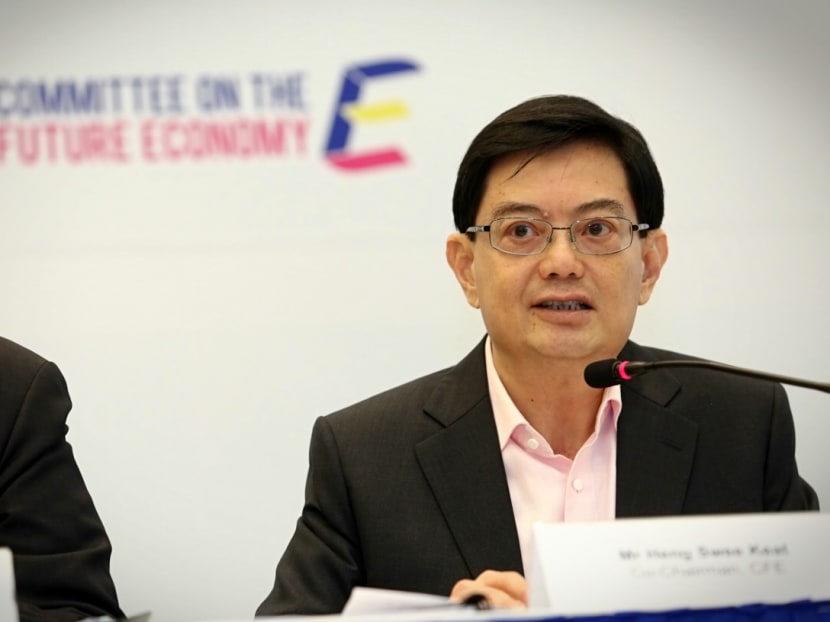CFE charts Singapore's way forward: Who dares, wins
SINGAPORE — Despite the challenging global environment, there are opportunities for Singapore to thrive over the next decade. But the country needs to be innovative, bold and willing to change, on top of remaining open to the world and deepening its knowledge of markets around the world.

Minister for Finance Heng Swee Keat at the announcement of the CFE recommendations. Photo: Nuria Ling/TODAY
SINGAPORE — Despite the challenging global environment, there are opportunities for Singapore to thrive over the next decade. But the country needs to be innovative, bold and willing to change, on top of remaining open to the world and deepening its knowledge of markets around the world.
This was the clarion call from the high-powered Committee on the Future Economy (CFE), which has completed its year-long work of charting out strategies to secure the Republic’s economic success over the longer term.
“Our vision is for us to be the pioneers of the next generation,” the CFE said in its much-anticipated 109-page report, which was released on Thursday (Feb 9).
“In the future economy, our people should have deep skills and be inspired to learn throughout their lives; our businesses should be innovative and nimble; our city vibrant, connected to the world, and continually renewing itself; our Government coordinated, inclusive and responsive.”
To achieve this vision, the Government, companies and individuals need to work together to pursue seven “mutually reinforcing” strategies, aimed at keeping the country plugged into the world, and building the capabilities of its people and organisations.
These comprise the need to deepen and diversify international connections; acquire and utilise deep skills; strengthen enterprise capabilities to innovate and scale up; build strong digital capabilities; develop a vibrant and connected city of opportunity; develop and implement Industry Transformation Maps (ITMs); and partner each other to enable growth and innovation. Apart from spelling out the strategies, the committee made a slew of suggestions, including several which the Government had already taken up. The ITMs, for example, was announced in Budget 2016 and have been rolled out for six industries.
Among the new proposals which the Government is considering include reviewing the tax system to take into account rising social expenditure and international tax developments, and the setting up of a Global Innovation Alliance where Singapore’s institutes of higher learning and companies can link up with overseas partners in major innovation hubs and key markets.
The committee has also proposed that the Ministry of Education make available its online learning platform — which is being developed — to children of Singaporeans working abroad, to help them keep in touch with the national curriculum.
It also suggested training full-time national servicemen in cybersecurity, as part of efforts to build deep capabilities in this area.
The Government will respond to the CFE’s recommendations in this year’s Budget statement which will be delivered on Feb 20.
The committee was co-chaired by Finance Minister Heng Swee Keat and Trade and Industry (Industry) Minister S Iswaran. The setting up of the committee to review Singapore’s economic strategies was first announced by Prime Minister Lee Hsien Loong in Oct 2015, at the swearing-in ceremony of the new Cabinet formed after the General Election in September that year.
Starting its work in January last year, the CFE has engaged more than 9,000 stakeholders, including Trade Associations and Chambers (TACs), unions, companies, academics, workers and students.
This is the third committee the Government has convened over the decades to review the economy, following the Economic Review Committee and the Economic Strategies Committee (ESC) which were set up in 2001 and 2009, respectively.
Speaking at a press conference held at the PSA Building, Mr Heng noted that “the question of how Singapore stays relevant to the world is a question for ever”. He added: “There isn’t a detailed roadmap to say, ‘follow this and you’ll reach there’ but rather, we have to find our way, we have to experiment.” Given the rapid changes taking place globally, the key is for the country to remain very adaptable, he said.
Mr Iswaran reiterated that the emphasis of the CFE recommendations was on developing the capabilities of Singapore companies. For the workers, acquiring deep skills and knowledge will provide “a certain level of resilience”, he added.
Citing the recent backlash against globalisation as a significant threat to Singapore, the committee called on Singapore to not only remain open but also expand and deepen its links overseas.
Recounting how many people had laughed off Singapore’s first free trade agreement inked in 2000 with New Zealand, Mr Heng pointed that the Republic has been a firm believer in globalisation and free trade - and this will continue to be so, even if it means going against the tide.
Commenting on the CFE recommendations, PwC Singapore partner Winston S Nesfield said that Singapore’s success in meeting its 2 to 3 per cent annual growth target over the next decade will “provide much needed ammunition” against the shift towards more protectionist policies. “Singapore can be the ‘globalisation laboratory’ for the rest of the advanced world... Its success within a smaller but highly advanced ecosystem will inspire other leading economies,” he said.






